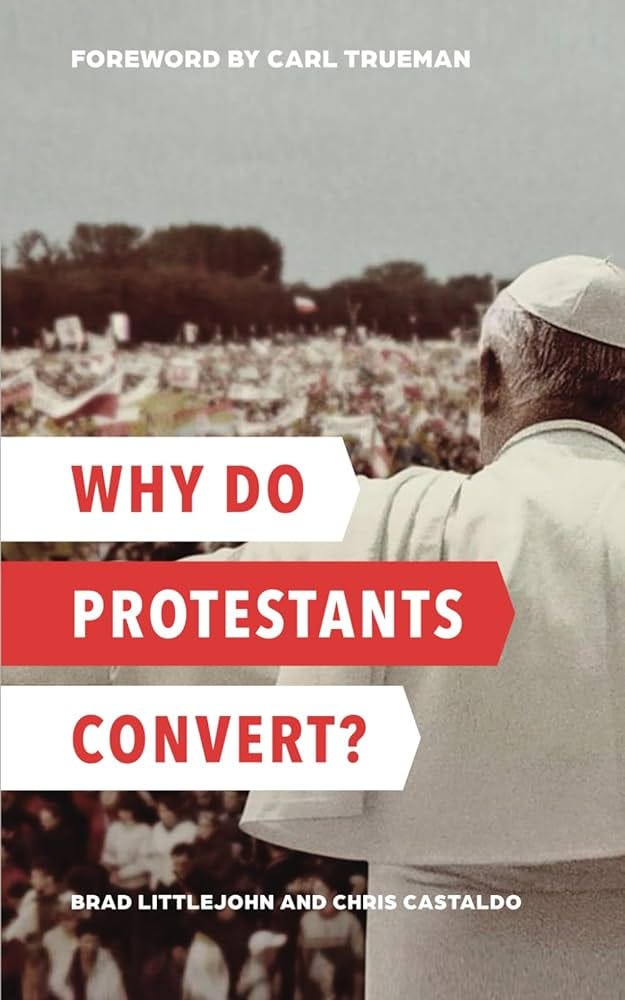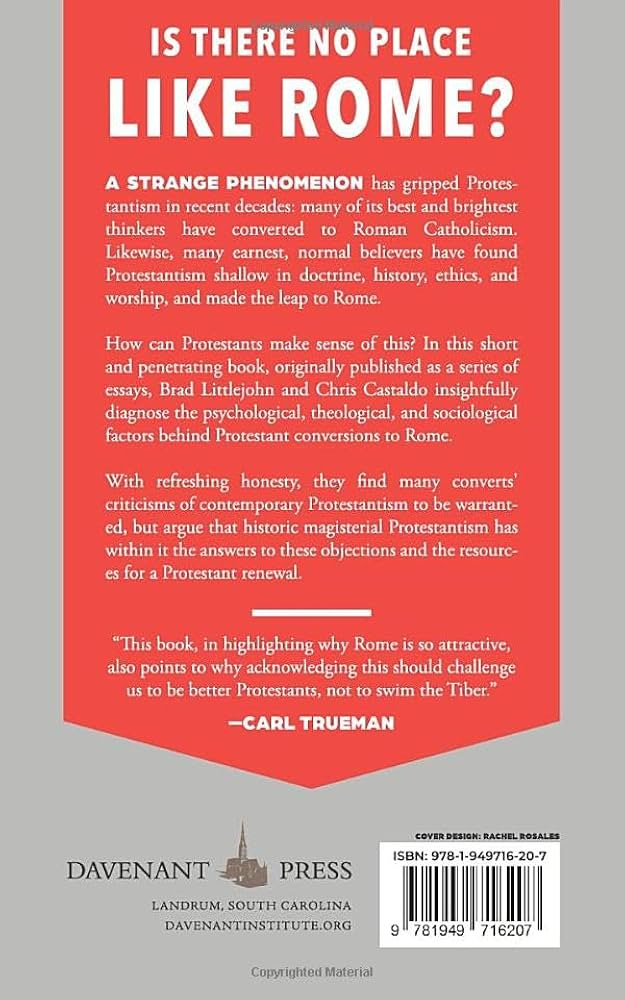Why Do Protestants Convert? - Resource Recommendation
Uncatechized Protestants are turning to the Catholic Church.
In a post on Instagram last fall, I wrote:
Upon discovering the shortcomings of Protestant churches, many are turning to the Catholic Church. Catholicism offers a reverence not found in most of modern “Christianity,” a serious treatment of the sacraments not found in most evangelical churches, and an emphasis on and appreciation for church history neglected in most congregations.
In short, Protestantism has glaring faults, [however], Catholicism is not the answer.
If you have found Protestantism lacking, it’s true—it is. But don’t be deceived into thinking the alternative is modern Catholicism whose glaring faults are still more ill. Instead, examine whether you have unduly placed your faith in the institutions of man.
Many Catholic commenters charitably invited reading Protestants to join their ranks, but some ran immediately to ridicule with comments like:
“Oh look, another Protestant who grossly misunderstands Catholicism and historic Christianity.”
“Instead of being anti-Catholic everyone just say ‘I don’t understand theology.’”
“You don’t even know what the word Catholic means or [where it] comes from. Let alone theology.”
“Wow this is wild propaganda.”
In a follow up post, I aimed to briefly clarify the original reason for Protestantism and how much of it has gone astray just like the Catholic Church through accretions:
Accretion: a thing formed or added by gradual growth or increase. This is a good word to keep in mind in this Age of Deconstruction.
Protestantism was not the start of a new church, but an attempt to remove accretions from the existing church. The Catholic Church [may have] started off well, but over the centuries, accretions corrupted the pure doctrine of the apostles and the reformers purposed to recover it.
The modern Catholic Church no longer resembles the church established by Christ and the apostles. Unfortunately, neither do the majority of Protestant churches, dealing with accretions of their own, such as seeker sensitive music productions and charismania.
Many Protestants are coming to terms with the pragmatic accretions that have left their churches doctrinally deficient, leaving them perpetual babes in the faith, subsisting on a diet of milk. A decades-long reign of evangelical fluff in the visible church has caused a pendulum swing of voracious Christians opting for the Catholic Church, which legitimately offers a diet of meat via church history and liturgy for the starved Protestant. Yet the truth remains that both camps hold to practices and/or doctrines that endanger the soul, alternating between asceticism and pragmatism.
A new reformation is in order. Mind the accretions; hold to what is true.
Thankfully, this didn’t draw any additional attention, but I was left with an impression of Catholics I didn’t have before. They really believe Protestants are ignorant of church history—and they are right.
While there are plenty of individual Protestants, and even some remnant congregations, who are versed in church history (and can cite this as a reason for their Protestantism), the truth is that the vast majority of Protestants and evangelicals are so far removed from the nuance of church history, that Catholics have good reason to ridicule the puffed-chested stand they take on their faith.
I deduced that this, among many other reasons, is why we are seeing so many Christians leave behind their Protestant upbringing to join the Catholic Church. The rate of conversions is becoming astonishing. If the number one problem of Protestantism is people deconstructing and leaving the faith altogether, the runner-up is leaving their upbringing for Catholicism. And I don’t blame them.
Why do Protestants convert?
I only had a moment contemplating all this when a friend dropped a small book in my inbox (published the same month as my Instagram posts) that confirmed everything my intuition was telling me to be true. Why Do Protestants Convert? by Brad LittleJohn & Chris Castaldo.
Link: Why Do Protestants Convert?
The author so poignantly outlined everything I had experienced in evangelical churches that I just had to hang my head and ask myself what have we done?
“Many times, [Christians] are not wrong to sense that something is wrong: that the gospel that they’re getting is missing moral seriousness and a call to Christian virtue; that the proof-texts they’re hearing are deaf to context and lacking in Christian wisdom; that they story they’re being told to inhabit began with the founding of their own congregation three decades ago, and has no deeper connection to two millennia of Christian history. Most sacramental theology and practice is abysmal in American Protestantism. Most catechesis and moral formation is extremely thin. In most churches, historical awareness is rare, and philosophical rigor non-existent. Effective shepherding and discipline that knows how to wield real spiritual authority with paternal care and patience is certainly the exception rather than the rule. The list could go on and on.”
The anemic state of the Protestant faith and its fruit of Catholic conversions is worth your time to investigate.
(See also: The Catholic Doctrine of Mary, Christian Liberty & Pragmatism.)
No Root, Bad Fruit
Catholics famously quote Cardinal Newman saying, “To be deep in history is to cease to be Protestant.” Whether that is objectively true or not is debatable, but many Protestants are coming to the subjective conclusion that it is compellingly true. Countering this famous Catholic quip, I have heard it said by a highly educated Protestant friend that “the Catholic Church doesn’t own church history.”
While the benefits of knowing the nuances of church history are incalculable, it doesn’t take a historical narrative to figure out that Protestantism’s biggest problems don’t lie in the past, but in the present.
Within most evangelical circles, the average conversion experience is based not on the historical understanding of God’s sovereign work in the world, but on the modern understanding of decisionism. In this view, a soul is not plucked from their hopeless and lost state by sovereign grace alone, but makes an intellectual assent to a gospel message, thereby “deciding” to follow Jesus. Whether their life bears out their confession or not is virtually irrelevant. After being declared a Christian by a counseling authority, the convert is typically turned over to a series of shallow Bible studies through mediums like Tony Evans or Lisa Terkeurst, kept in and returned to a state of positivity through contemporary Christian music, and strung out on a diet of weekly pep-talk sermons. In a word, the average convert in Protestantism is uncatechized.
Consequently, many are not necessarily regenerated from within, but merely converted into a pop culture Christianity with no root, overcome by tribulation when it strikes, just as Christ described in the parable of the sower (Matt. 13). This is because the conversion was the result of man’s pragmatic manipulations to begin with. If they don’t fall away from the faith entirely (as we are seeing in droves with the deconstructionist movement), they are leaving the ranks of Protestant churches to have their empty bellies filled with what seems to be their only alternative in Catholicism.
If there was no root in the original Protestant conversion, is converting to Catholicism the development of an actual root from which good fruit will come? Or is converting to Catholicism bad fruit altogether? Conversely, is the Catholic right in saying that a conversion to Protestantism is the bad fruit? The answer is truly this: It all depends.
There is a true appeal in Catholicism for not just the mind, but the outward expressions of one’s beliefs. According to the authors of Why Do Protestants Convert?,
“A common theme among those converting to Rome or wrestling with it is to critique Protestant ‘Gnosticism’ and to celebrate the ways in which Rome satisfied spiritual longings that evangelicalism could not, providing worship for the whole body and soul, and not just the mind.” - pg. 17
The reasons they outline for Protestant conversions are:
A hunger for authority
A deficit of holiness
A desire to be in the “inner ring”
A quest for certainty
Catholicism being in touch with history
A tangibility of grace
They are tired of division
They are tired of shallowness
They are tired of being irrelevant
If you want poignant insight on why Protestants are converting to Catholicism, download Why Do Protestants Convert? It is worth your time and you can have it read in a weekend!




